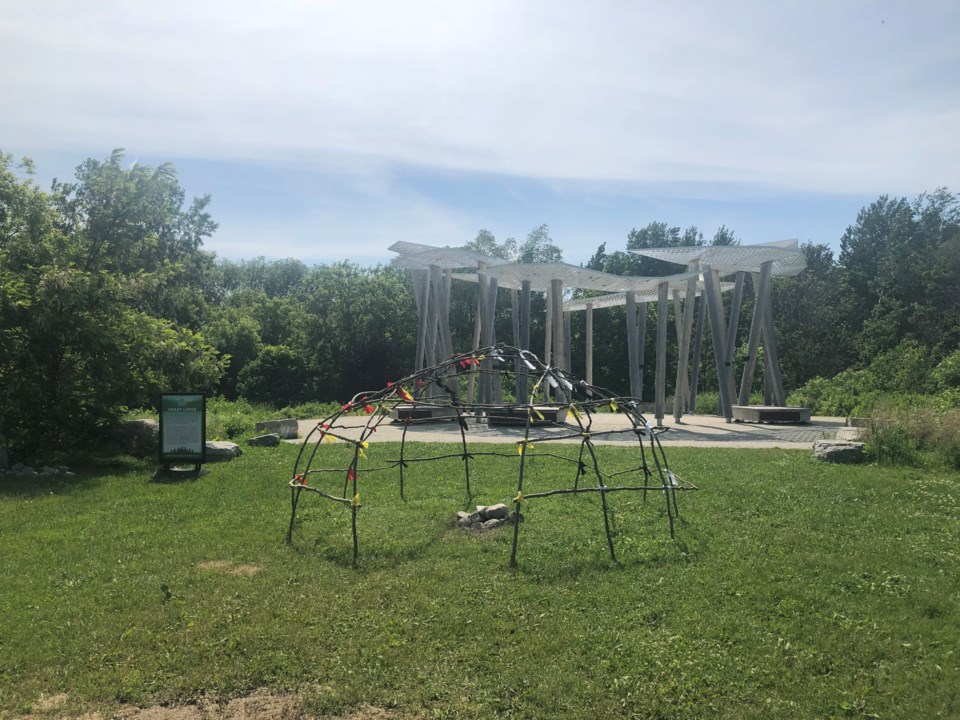NEWS RELEASE
TOWN OF COLLINGWOOD
**********************
In honour of National Day for Truth and Reconciliation (Orange Shirt Day) Sept. 30, the Indigenous community is having a Sacred Fire Gathering. Part of reconciliation is providing cultural access because the social systems during the creation of Canada did not allow Indigenous people to practice their language, spirituality, ceremonies, music and more.
“We are hosting a two-part event where the Indigenous community can relearn drumming songs and sing which is sacred – this is open only to First Nations, Metis, and Inuit people. This part starts at 4:30 p.m. To the Indigenous community: bring your drum, shakers and if you don’t have that, bring just your voice. We will also have a sharing circle with Elder James Kewaquom, and a Sacred Fire with fire keeper Opichi Commanda and Wah’chek to honour the residential school victims at 5:30 p.m. You can participate in as little or as much as you want,” says Muckpaloo Ipeelie, event organizer.
Later, at 6:45 p.m., the Greater Collingwood Community is invited to join in support of the Indigenous Community. To learn about Restoration to Harmony from an Inuit lens and to also listen to Collingwood’s Poet Laureate Jillian Morris who is Kanien’kehá:ka as she recites poetry to honour National Day for Truth and Reconciliation.
“This gathering is not about learning the truth as you will have many opportunities throughout the month to learn. This gathering is about showing your support to us, being with us as a community and honouring the First Nation, Metis and Inuit children who went to residential schools. We will finish with sending flowers together in the water to honour the children and the residential school survivors many of whom are Elders now or who are in their 30s and older,” says Ipeelie.
Members of the community are invited to the Sacred Fire Gathering which is taking place at 6:45 p.m. at the Awen’ Gathering Place in Collingwood on Friday, Sept. 30.
What should I bring to this gathering that starts at 6:45 p.m.? (Optional)
- Loose tobacco for the Sacred Fire
- Red tobacco ties for Elders and fellow Indigenous people as a show of respect
- An orange ribbon to tie on the Sweat Lodge
- Wear orange if you can
There are opportunities in the coming week to learn about Canada’s history and Indigenous people. For more information on this event and all initiatives happening for National Day for Truth and Reconciliation, visit the town's website.
Orange Ribbons, Every Child Matters buttons designed by IndigenARTSY and other items in orange envelopes, are available while supplies last at the Collingwood Museum, 45 St. Paul Street, Collingwood Public Library, 55 Ste. Marie Street and Town Hall, 97 Hurontario.
“This event is only possible by the participation of several local Indigenous people who are coming to make this event sacred, spiritual, healing and welcoming with the support of the Town of Collingwood. Thank you to those who are playing a role in facilitating this event for the benefit our community,” says Ipeelie.
Muckpaloo’s Ipeelie’s thoughts: what is truth, and how does bias affect it?
Bias is prejudice in favour of or against one person, or group and is usually considered to be unfair. In Canada, bias exists because of the lack of historical knowledge from settlers in Canada about what happened to our Indigenous people. The social systems brought over and enforced across the country were created by settlers. The truth is Indigenous people had to learn quickly how to exist in a colonial system while experiencing genocide. Without understanding the imbalance this has created between settlers and Indigenous people, this will continue to cause long-standing despair, perpetual poverty, mental and physical illness. Every Indigenous community and person has been affected by intergenerational trauma. This is where reconciliation is needed.
You can help restore ‘friendly relations’ which is reconciliation. You can help as you exist in the social systems that influence equity. By your voice, advocating for us, providing Indigenous cultural access, employing us, consulting Indigenous people before making decisions that affect us, and holding space to help bridge the gap that the imbalance has created.
